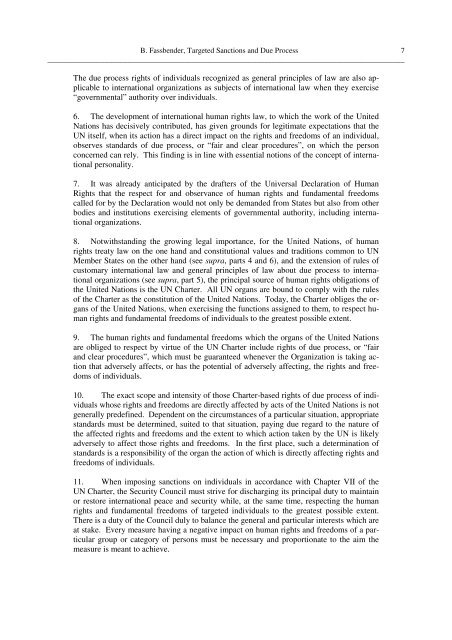Targeted Sanctions and Due Process - United Nations Treaty ...
Targeted Sanctions and Due Process - United Nations Treaty ...
Targeted Sanctions and Due Process - United Nations Treaty ...
Create successful ePaper yourself
Turn your PDF publications into a flip-book with our unique Google optimized e-Paper software.
B. Fassbender, <strong>Targeted</strong> <strong>Sanctions</strong> <strong>and</strong> <strong>Due</strong> <strong>Process</strong><br />
7<br />
______________________________________________________________________________________________<br />
The due process rights of individuals recognized as general principles of law are also applicable<br />
to international organizations as subjects of international law when they exercise<br />
“governmental” authority over individuals.<br />
6. The development of international human rights law, to which the work of the <strong>United</strong><br />
<strong>Nations</strong> has decisively contributed, has given grounds for legitimate expectations that the<br />
UN itself, when its action has a direct impact on the rights <strong>and</strong> freedoms of an individual,<br />
observes st<strong>and</strong>ards of due process, or “fair <strong>and</strong> clear procedures”, on which the person<br />
concerned can rely. This finding is in line with essential notions of the concept of international<br />
personality.<br />
7. It was already anticipated by the drafters of the Universal Declaration of Human<br />
Rights that the respect for <strong>and</strong> observance of human rights <strong>and</strong> fundamental freedoms<br />
called for by the Declaration would not only be dem<strong>and</strong>ed from States but also from other<br />
bodies <strong>and</strong> institutions exercising elements of governmental authority, including international<br />
organizations.<br />
8. Notwithst<strong>and</strong>ing the growing legal importance, for the <strong>United</strong> <strong>Nations</strong>, of human<br />
rights treaty law on the one h<strong>and</strong> <strong>and</strong> constitutional values <strong>and</strong> traditions common to UN<br />
Member States on the other h<strong>and</strong> (see supra, parts 4 <strong>and</strong> 6), <strong>and</strong> the extension of rules of<br />
customary international law <strong>and</strong> general principles of law about due process to international<br />
organizations (see supra, part 5), the principal source of human rights obligations of<br />
the <strong>United</strong> <strong>Nations</strong> is the UN Charter. All UN organs are bound to comply with the rules<br />
of the Charter as the constitution of the <strong>United</strong> <strong>Nations</strong>. Today, the Charter obliges the organs<br />
of the <strong>United</strong> <strong>Nations</strong>, when exercising the functions assigned to them, to respect human<br />
rights <strong>and</strong> fundamental freedoms of individuals to the greatest possible extent.<br />
9. The human rights <strong>and</strong> fundamental freedoms which the organs of the <strong>United</strong> <strong>Nations</strong><br />
are obliged to respect by virtue of the UN Charter include rights of due process, or “fair<br />
<strong>and</strong> clear procedures”, which must be guaranteed whenever the Organization is taking action<br />
that adversely affects, or has the potential of adversely affecting, the rights <strong>and</strong> freedoms<br />
of individuals.<br />
10. The exact scope <strong>and</strong> intensity of those Charter-based rights of due process of individuals<br />
whose rights <strong>and</strong> freedoms are directly affected by acts of the <strong>United</strong> <strong>Nations</strong> is not<br />
generally predefined. Dependent on the circumstances of a particular situation, appropriate<br />
st<strong>and</strong>ards must be determined, suited to that situation, paying due regard to the nature of<br />
the affected rights <strong>and</strong> freedoms <strong>and</strong> the extent to which action taken by the UN is likely<br />
adversely to affect those rights <strong>and</strong> freedoms. In the first place, such a determination of<br />
st<strong>and</strong>ards is a responsibility of the organ the action of which is directly affecting rights <strong>and</strong><br />
freedoms of individuals.<br />
11. When imposing sanctions on individuals in accordance with Chapter VII of the<br />
UN Charter, the Security Council must strive for discharging its principal duty to maintain<br />
or restore international peace <strong>and</strong> security while, at the same time, respecting the human<br />
rights <strong>and</strong> fundamental freedoms of targeted individuals to the greatest possible extent.<br />
There is a duty of the Council duly to balance the general <strong>and</strong> particular interests which are<br />
at stake. Every measure having a negative impact on human rights <strong>and</strong> freedoms of a particular<br />
group or category of persons must be necessary <strong>and</strong> proportionate to the aim the<br />
measure is meant to achieve.
















